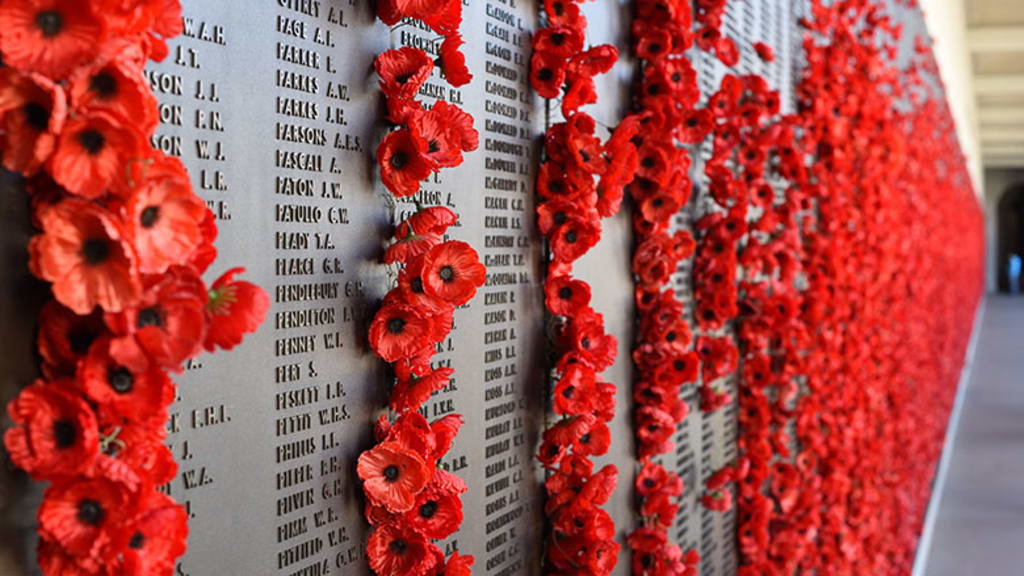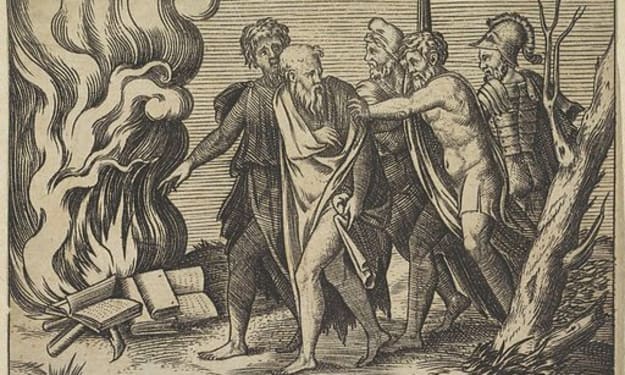Lest we Forget: Respectfully, We Need to Fix Our National Day of Remembrance.
This is an essay about ANZAC day, Australia and New Zealand's national day of remembrance for the veterans of wars. But if you mentally substituted "ANZAC Day" for "Veterans day", "Memorial day", or "Remembrance Day", it would still read seamlessly. Just as the world wars touched many nations, so do the issues associated with commemorations. The best way to honour those who fought and died would be to recommit ourselves to world peace.

Every ANZAC Day I am reminded of the old adage about the American civil war. ‘As a child you are taught that the civil war was about slavery. As you grow older, you learn that there were a myriad of complex factors that contributed to the war. But as you grow up, you learn that it was about slavery.’ Situations are always more complex than they seem, but a greater understanding of those complexities sometimes obscures simple truths. As a contrarian teenager, I believed that ANZAC Day was a bunch of old people glorifying war, so that us youths would be happy little soldiers for the next imperialist expansionist adventure. Of course, I grew out of that view, as I realised that the sacrifices made by those who fought for our rights deserves to be honoured. But every April 25th, my heart sinks as I see the glorification of war seep into that sombre reflection on sacrifice. ANZAC Day may not be about the glorification of war, but it’s sadly used that way.
It’s no coincidence that the glorification of war is proliferating as the generation of men and women who fought fades away. It is hard to glorify war while addressing people who are still experiencing trauma from a war 80 years ago. But as the purpose of ANZAC Day becomes more abstract, as the men and women who it honours become less present, the true meaning of their sacrifice, which was to secure peace for future generations, gets lost in a kind of nostalgia. Wistful remembrance of their bravery succumbs to an urge to appropriate their valour. Ten years ago, it was controversial to attend ANZAC Day commemorations in place of your antecedents, wearing their medals; now it’s unremarkable, perhaps the majority of those marching are doing so on behalf of someone else.
Of course there is nothing wrong with honouring your family’s past, and acknowledging that you have a personal familial connection to a traumatic historical event that defines the modern world. Let alone honouring the extreme sacrifices those people made. Remembering our history is noble and important, and ANZAC Day is essential as a day devoted to remembering. But let’s take a closer look at how we go about honouring and remembering, and whether that reflects what they fought for. In much the same way that the glorification of war would be offensive to those who have experienced it, let’s ensure that we commemorate ANZAC Day in a way that truly demonstrates that we understand what they fought for, peace.
Peace was what they fought for. No one could argue otherwise. What they experienced is more horrible than what most people in the peaceful present could imagine; only a hope and promise as compelling as everlasting peace could get someone through that. It’s the ultimate example of “a society grows great when old men plant trees in whose shade they know they shall never sit.” So an ANZAC Day that was devoted to delivering the everlasting peace that they were promised, I believe, would be the ideal way to honour their sacrifice going forward.
Because unfortunately, the world has been woefully unable to deliver on that promise. ANZAC Day commemorates the landing of the Australia and New Zealand Army Corps (ANZACs) at the Gallipoli Peninsula in Turkey on April 25th 1915, during World War 1. It has grown to commemorate all others who served in military campaigns since, especially in World War 2. But tragically, the World Wars were not the last conflicts that the world has seen, or even the last that the Western world has seen. The world has fallen woefully short in the promise of peace that it always makes to those who fight.
A day of remembrance, in which that remembrance was for the purposes of promoting peace seems like a no-brainer to me. But it’s also easy to see why it’s not done. We like triumph, or failing that, noble failure. Stories about how we defeated the enemies of freedom, or of battles fought to the last man against overwhelming forces are inspiring. Whereas our ongoing inability to secure world peace is an embarrassing failure. Imagine a day celebrating world peace, capped off by reports on the six o’clock news of the latest bloody conflict. But these ongoing tragedies are the reason we must devote ourselves wholly to peace.
Let's look at what peace means too. Although the absence of war would be a huge step forward for humanity, the absence of war is not by itself peace. World War 2 is particularly illustrative of this principle. Adolf Hitler was not just an expansionist who wanted to conquer Europe to expand his political power, he was also a genocidal bigot who murdered millions of civilians out of nothing other than bigotry. Today we remember that as the primary reason he had to be stopped. And just as peace would be the ideal way to honour those who fought in wars, an end to bigotry, hate, and injustice would be the ideal way to honour those who fought against the bigotry, hate, and injustice of the Nazi regime.
When I was a kid, my dad had a collection of tabletop war games. Basically exceedingly complex board games, which recreated World War 2 battles. The sort of thing that would today be a video game like Call of Duty. You could either play as the Allies, or “The German Army”. Apart from being represented by swastikas, the fact that “The German Army” actually represented a genocidal fascist regime was occluded (understandable perhaps if these were games for kids. But they weren’t). The games promoted a whitewashed version of the history of WW2, in which the two opposing sides were noble adversaries playing a deadly game of capture the flag. If those who do not remember the past are doomed to repeat it, I cannot think of a more important thing to remember than the evil that the Nazis did, and why they had to be stopped.
Let us not forget that the harrowing war that is occupying the world at the moment is being fought by a man who has lead a campaign of legislative oppression of LGBTQIA people in his own country, which according to Human Rights Watch, has lead to an “uptick in often-gruesome vigilante violence against [LGBTQIA] people in Russia”.
In that vein, we must also abandon the provincialism that defines ANZAC day. ANZAC Day is our day, a day for Aussies and Kiwis to commemorate our own sacrifices, and I am not saying it should be any other way. But New Zealand is one of the most ethnically diverse countries in the world, with over 200 different ethnicities within our communities. A quarter of all kiwis were born overseas. The city where I live, Auckland, is the fourth most diverse city in the world, ahead of Los Angeles, London, and New York. There are kiwis who were involved in, or are connected to wars and conflicts in places that we don’t traditionally associate with ANZAC Day. If ANZAC Day is for all Kiwis who have served in military campaigns, then it must reflect a more diverse culture by recognising a wider history of conflict. They are us!
That suggestion should not be controversial, but we’ve sadly seen that it is. In 2017, Yassmin Abdel-Magied, made a Facebook post pairing ANZAC Day’s slogan “lest we forget” with places of modern conflict such as Syria and Palestine, as well as Australia’s infamous refugee detention centres at Manus and Nauru. Abdel-Magied, who had two years earlier been named Queensland Australian of the Year, and was named one of Australia’s 100 most influential engineers was forced to move house and change her phone number due to threats she received, including daily death threats, and graphic videos of rapes and beheadings. Government ministers including Prime Minister Malcolm Turnbull urged her to “self-deport to an Arab dictatorship”, and a high profile radio commentator joked about running her over. She eventually moved to London. All for suggesting that military conflicts that we don’t traditionally associated with ANZAC Day are as worthy of remembering as those that we do associate with the venerable day.
The backlash was no doubt made worse by the fact that Abdel-Magied is a Muslim, and was born in Sudan (her family moved to Australia when she was 18 months old). This fact exposes the ugly truth about ANZAC Day’s provincialism, it’s about favouring the European victims of European wars over all others. Abdel-Magied (reportedly) made a statement acknowledging “that the timing and nature of the post was disrespectful”. It definitely was not disrespectful. It was a call to use ANZAC Day as it was intended, as a day of remembrance for the sacrifices and traumatic experiences of all those who have fought and died in war.
The people who do not believe that a Muslim should enjoy the same freedom of speech as they do, or believe that the lives of soldiers with different coloured skin, in placess that they’ve never heard of, are not as worthy of remembering as their grandfathers, are of the same ilk as those we fought against in World War 2. To forget that is to make a mockery of the free and tolerant society that millions of brave men and women have fought and died for. When we say “lest we forget”, we need to ensure that we haven’t already forgotten.
Because, now more than ever, we need to remember that those who fought and died did so to secure precious peace, and we need to honour that.
About the Creator
Michael Atkins-Prescott
Non-binary artist, DJ writer, bird fancier and licensed forklift driver.
I'm in New Zealand, with my wife and a cat, a pretty decent kitchen,and a turntable I fixed myself.
pssstt... https://linktr.ee/michaelatkinsprescott






Comments
There are no comments for this story
Be the first to respond and start the conversation.